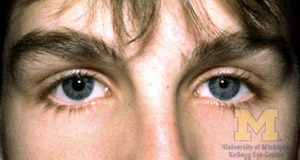 4
4
Question: Which of the following may cause anisocoria?
1. Normal physiology
2. A deficit of sympathetic innervation
3. A deficit of parasympathetic innervation
4. 3rd nerve paresis
5. Trauma
6. Congenital anomalies
7. Pharmacologic agents
8. Exposure to plant material